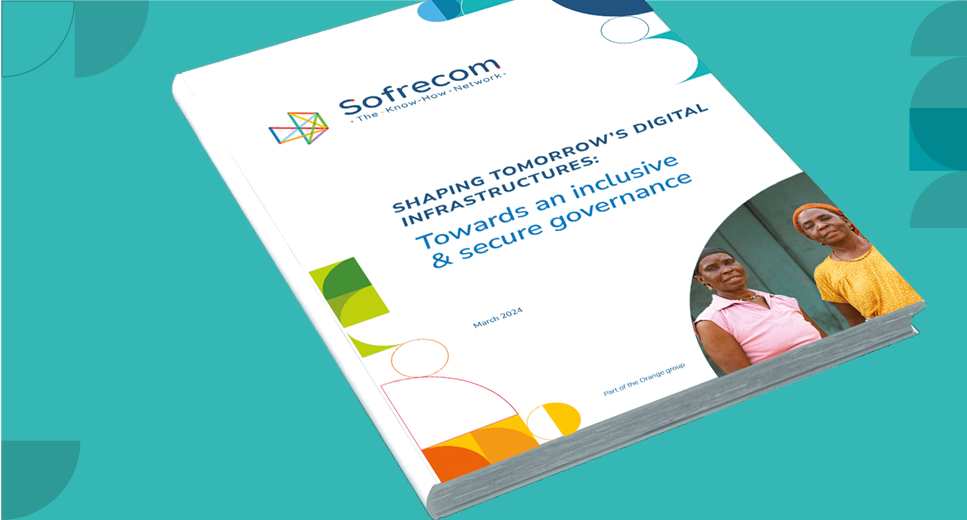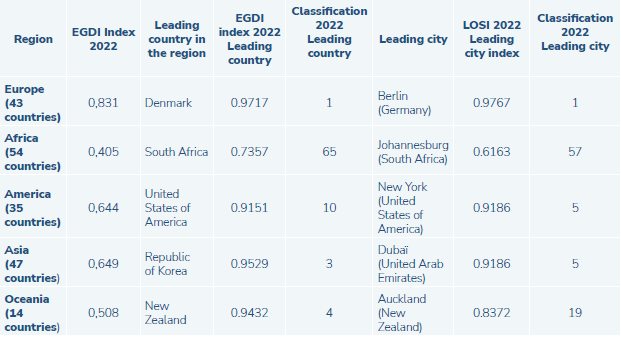Governments have played a crucial role in the global health crisis through digital technologies. However, to ensure the inclusion of everyone, an inclusive and integrated digital ecosystem is essential to «Leave No One Behind.»

In the dynamic landscape of global governance, the 12th UN survey on the development of E-Government, published in 2022, illuminated the escalating impact of digital transformation and governance in hastening the realization of the ambitious 2030 Agenda. Amidst the tumult of a global health crisis, digital technologies have empowered governments to assume pivotal roles. Nevertheless, the imperative remains clear: «Leave no one behind.»
Methodology of the E-Government study 2022
The United Nations Department of Economic and Social Affairs (UNDESA) released the 12th edition of its survey— the E-Government Survey 2022— covering the development of E-Government among the 193 member states of the UN in June 2022. This study was based on the E-Government Development Index (EGDI), which represents the weighted average of three indicators:
- The Telecommunication Infrastructure Index (TII): Measuring the penetration of fixed and mobile internet access infrastructure
- The Human Capital Index (HCI): Assessing adult literacy rates and enrollment in education
- The Online Service Index (OSI): Evaluating the quantity and quality of e-services provided. For the first time in 2022, the OSI has been refined and calculated based on 5 weighted sub-indices: service provision (45%), e-participation (35%), institutional framework (10%), technology (5%), and content provision (5%).
This updated version of the survey also includes the assessment of city portals, expanding from 100 cities evaluated in 2020 to 193 in 2022, representing the most populous city in each of the 193 United Nations member states. The Local Online Services Index (LOSI) is based on 86 indicators spread across 5 distinct criteria.
Moderate regional and national evolution of e-government
The escalating integration of digital technologies has underscored the pressing need for worldwide digital transformation. Despite an overall upward trajectory in EGDI values, the pace of development has remained relatively steady over the past biennium. From 2020 to 2022, the global average EGDI value climbed marginally, from 0.5988 to 0.6102, reflecting incremental advancements fueled by bolstered telecommunication infrastructures and advancements in human capital. Europe continues to lead the charge in E-Government advancement, closely followed by Asia, the Americas, Oceania, and Africa. However, for the first time since 2016, Oceania witnessed a dip in its average EGDI value, primarily due to a substantial 20% decline in the regional Telecommunication Infrastructure Index (TII) over the preceding two years.
Conversely, Africa has made notable strides, boasting a 3.6% surge in its average EGDI value. Several African nations have made headway in enhancing their telecommunication infrastructures, laying a robust groundwork for expediting the shift towards digital governance. Nevertheless, their progress is impeded by the disproportionately high cost of mobile broadband subscriptions relative to gross national income per capita. The findings of the 2022 survey reaffirm the global momentum towards heightened levels of E-Government development. Fourteen countries have ascended to higher EGDI tiers, while three have regressed.
Leading the pack in the 2022 rankings are Denmark, Finland, and the Republic of Korea. Remarkably, only four out of 54 African nations boast an EGDI surpassing the global average: South Africa, Mauritius, Seychelles, and Tunisia. This underscores the ongoing challenges and opportunities in the journey towards comprehensive digital governance on a global scale.
Local e-government progresses with less significance
At the local level, the average value of the Local Online Service Index (LOSI) increased from 0.43 to 0.51 between 2020 and 2022. Cities play a pivotal role in driving both national and global change, and enhancing people’s lives. Despite the persistent digital performance gap between city portals and their national counterparts, most cities—especially the most populous ones—have seen improvements in their scores. This can be attributed to better access to crucial resources such as a skilled workforce, a broad knowledge and skill base, and dedicated public budgets.

Significant evolution of online services in the COVID-19 era
Over the past two years, digital development has accelerated worldwide. Most countries have focused on managing the COVID-19 pandemic, prioritizing the delivery of online services that emphasize crucial sectors such as health, education, and social protection. The number of countries offering services enabling users to apply for
social protection programs and benefits (maternity care, family allowances, pensions, housing, and food subsidies) has increased by 17% since 2020.
Populations traditionally identified as vulnerable (the poor, disabled individuals, the elderly, immigrants, women, and youth) have benefited from these advancements and the number of countries providing information and services targeting specific vulnerable populations increased by 6% between 2020 and 2022. Nevertheless, additional efforts are needed to ensure that «no one is left behind» in E-Government and the broader digitization process.
The trend clearly leans towards the full digitization of government services, providing users with the ability to conduct (virtually) all types of transactions entirely online. However, at present, many countries use their portals to provide information and offer only partially digitized services, requiring citizens to physically visit government offices to complete most transactions.
The dual impact of e-government during the COVID-19 crisis
The COVID-19 pandemic underscored the critical importance of digital transformation in ensuring effective communication and collaboration between policymakers and society. In response, an overwhelming 90% of countries have swiftly implemented dedicated portals or expanded existing national platforms. By leveraging digital technologies, governments have successfully ensured the seamless delivery of essential public services, fostering resilience and connectivity amidst a backdrop of isolation, uncertainty, and heightened vulnerability. These technological advancements have played an indispensable role in coordinating pandemic responses and eliciting widespread public cooperation.
Overall, the pandemic has had a significant impact on the economies and societies of the world. It accelerated the digital transformation process, altering the role and perception of digitization at the international, regional, national, and local levels. As evidence, the number of internet users increased from 4.1 billion in 2019 to 5.2 billion in 2022.
However, the “easiest-to-reach” groups have benefited the most from the notable advances in E Government, while many among the poorest and most vulnerable populations have been «left behind.» The 2022 Survey revealed that approximately 45% of the combined population of United Nations Member States (3.5 billion people) remains lagging despite technological investments and developmental progress in many countries. The digital divide existed well before COVID-19, but it was exacerbated by the pandemic, which heightened socioeconomic and digital inequalities. The accelerated digitization of the public sector has also amplified this trend. The gap between the digitally connected and digitally disconnected continues to widen and very few countries have shown that they have engaged in online consultations involving vulnerable groups. To address the challenges related to development and the pandemic, governments must prioritize vulnerable populations. Unless decisive action is taken by the international community, the digital divide risks becoming the «new face of inequality».
«Leaving no one behind» in the hybrid digital society
Ensuring inclusivity in the trajectory of the hybrid digital society remains a formidable challenge, transcending boundaries of developed and developing nations alike. Despite significant progress achieved in recent decades, the importance of inclusivity has frequently been overlooked. As our public services and societal frameworks increasingly pivot towards digital reliance, those bereft of access, tools, or digital literacy face mounting hurdles in navigating the promises and potentials of the digital era. In this landscape, the prospect of digital inequality looms large.
Proactive, concerted action is essential to address and rectify existing gaps, thereby providing avenues of engagement among vulnerable populations. It demands a recognition of existing exclusions, a thorough identification of impediments to digital inclusion, and the formulation of targeted strategies for implementation. Governments, at both policy and regulatory echelons, are urged to espouse principles of «inclusion by design,» «default inclusion,» or «inclusion-first» to counter prevailing trends of digital hegemony and institutional invisibility. Such strategies are pivotal, yet nuanced and multifaceted, recognizing the diverse challenges faced by disparate groups.
In this collective endeavor, localized, contextually-relevant approaches emerge as linchpins, recognizing the unique barriers faced by distinct segments of society. The global community must rally, fostering knowledge exchange, forging strategic alliances, and bolstering collaborative capacities to ensure no nation languishes in the digital governance paradigm.
Moreover, the pandemic has served as a poignant reminder that the future unfolds in a hybrid terrain, not merely confined to the digital realm. Hence, the essence lies not in advancing digital agendas but in nurturing human development through the prism of digitization. Thus, an inclusive, integrated digital ecosystem emerges as our lodestar— the cornerstone upon which the ethos of «leaving no one behind» is firmly anchored.






